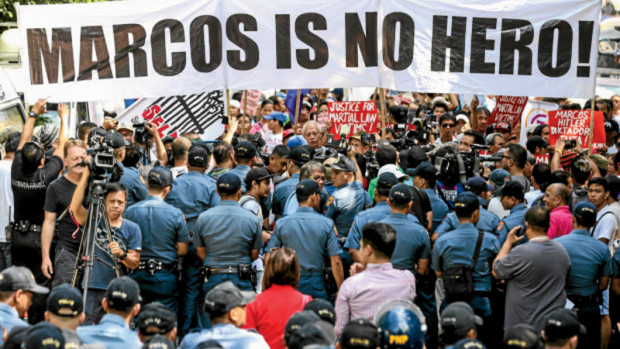Carpio: Marcos ineligible for Libingan burial

ANTI-MARCOS Militants protesting the burial of former President Ferdinand Marcos at Libingan ng mga Bayani are blocked by layers of police personnel near the Supreme Court as they wait for its ruling on the case.—LYN RILLON
Senior Associate Justice Antonio T. Carpio, in his dissenting opinion on allowing the burial of Ferdinand Marcos at the Libingan ng mga Bayani, noted the late dictator’s ineligibility to be interred at the hero’s cemetery, citing that Marcos had lost the honor upon his ouster.
READ: SC votes, 9-5, for burial of Marcos at Libingan
Here’s a summary of Carpio’s opinion as released by the Supreme Court public information office:
Senior Associate Justice Antonio T. Carpio focused on Marcos’s ineligibility to be interred at LNMB because of the sovereign action of the people of removing him from office as President and Commander-in-Chief.
He argued that even assuming that Marcos, as Medal of Valor awardee, was qualified for interment at LNMB, he ceased to be qualified when he was ousted on February 25, 1986. Citing Marcos v. Manglapus (1989), SAJ Carpio noted that the Court described Marcos as “a dictator forced out of office and into exile after causing twenty years of political, economic, and social havoc in the country.” He noted that Marcos’s forcible removal in February 1986 amounted to “the strongest form of dishonorable discharge from office since it is meted out by the direct act of the sovereign people.”
[Carpio] noted that Marcos’s forcible removal in February 1986 amounted to “the strongest form of dishonorable discharge from office since it is meted out by the direct act of the sovereign people.”
He pointed out that Marcos’s ouster is beyond judicial review and must be accepted as an incontrovertible fact which has become part of history. The removal was a direct exercise of the power of the Filipino people, which could not be called “honorable.”
Article continues after this advertisementREAD: Sereno: Marcos burial would be antithesis of symbolic reparation
He disagreed with the majority’s contentions that Marcos could not be considered dishonorably discharged as his separation was not in accordance with the procedures and guidelines prescribed in Circular 17, Series of 1987 of the Armed Forces of the Philippines because: (1) Marcos was separated from service before the circular was passed; the circular, an administrative act, cannot be applied retrospectively to undo a final act by the sovereign people; and (2) even assuming the circular applied to Marcos, he was still dishonorably discharged as the incontrovertible fact of ouster that is beyond both judicial and administrative review cannot be undone by a mere circular.
Article continues after this advertisementSAJ Carpio also disagreed with the position that the disqualifications under AFPR G 161-375 apply only to those in the active military service and do not apply to former Presidents. To subscribe to this view would negate the purpose for which the LNMB was originally established, which was to honor Filipino soldiers who fought for freedom and democracy. SAJ Carpio pointed out that “(i)ndeed, Marcos is the very antithesis of freedom and democracy because he was a dictator as declared by this Court.”
“Indeed, Marcos is the very antithesis of freedom and democracy because he was a dictator as declared by this Court.”
Moreover such a view would also be discriminatory against military personnel who are made subject to both qualifications and disqualifications while non-military personnel, such as former Presidents, are subjected to the qualifications but not the disqualifications.
SAJ Carpio disagreed with the majority’s position that there was a public purpose for the interment of Marcos’s remains. Defining “public policy” as “that principle which holds that no subject or citizen can lawfully do that which has a tendency to be injurious to the public or against the public good”, SAJ Carpio maintained that the President must implement the law considering the highest standards of promoting the public good as embodied in the Constitution, international law and municipal statutes. Accordingly, SAJ Carpio argued that the DND Memorandum is contrary to public policy as it would violate RA 10368. The President, in implementing the law, must observe the standard of recognition of the rights of human rights victims. Marcos’s interment at LNMB will cause injury particularly to human rights victims of his regime and the sovereign people who collectively ousted him. For this reason, he argues that the burial at LNMB is contrary to public policy.
Finally, SAJ Carpio points out that public funds cannot be spent for a non-public purpose. Marcos’s ouster by a sovereign act of the Filipino people constituted a dishonorable discharge; consequently, his interment at LNMB serves to convert his burial into a private affair of the Marcos family. No public purpose is served by transferring his remains to LNMB and public funds cannot be used for this purpose. CDG